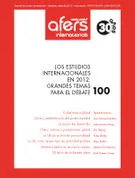Culture and global thought: Chinese international theory in the making

In this article, the author examines the study of international relations in China, a discipline that has proliferated as the country has opened up to the rest of the world. He examines the three main trends of international thought that have become most widespread: the first, which the author calls the obverse approach, situates Chinese thought as the theoretical basis for considering a genuine worldism, thanks to traditional concepts such as Tianxia and Confucian family bonds. Secondly, there is the reverse approach, which applies Western theoretical paradigms to the concept of power in ancient Chinese thinkers; this is a theory that emphasises the hierarchy of the international system and seeks international Chinese dominance. Finally, the third is more interactive, and which constructs an intercultural, thoughtful and critical dialogue, at the same time as applying autochthonous conceptual frameworks such as Confucian relationism, and foreign ones, such as rationalism.
Keywords: China, international relations, culture, paradigms, globalisation.